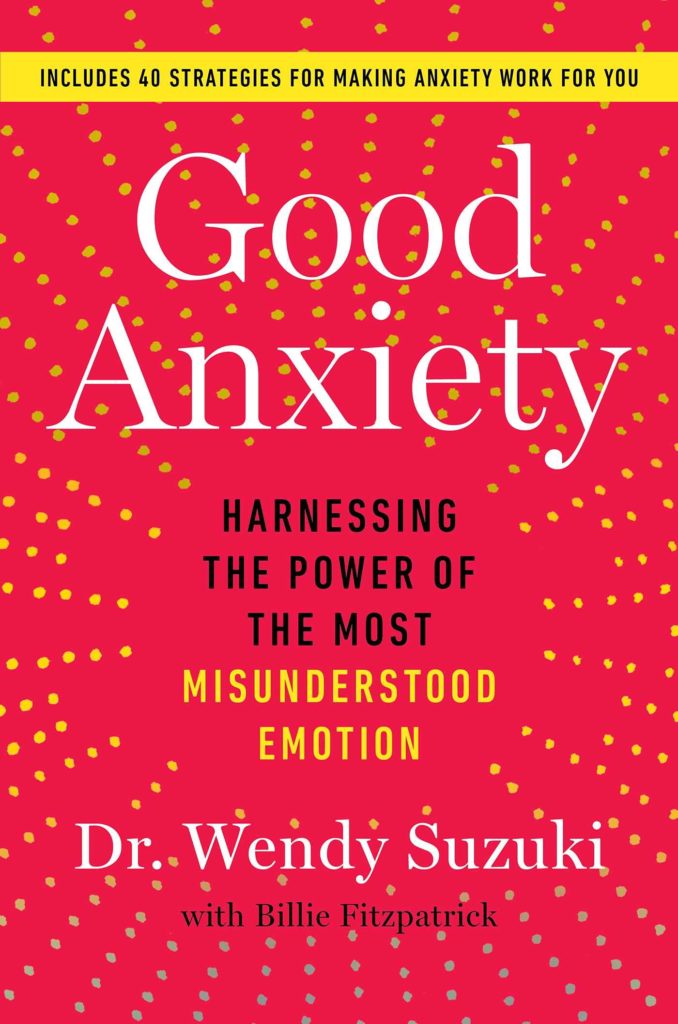Do the holidays stress you out? We have the perfect book suggestion for you….

The holidays can be a beautiful way to share and create some of the most cherished memories with your loved ones. They can also be some of the most harrowing and stressful times of the year – it’s a lot of money to spend, time to plan, effort to coordinate, you name it. The holidays don’t come with all joy and cheer. If the holiday season is a period of time that causes your cortisol levels to spike – what can you do? How can you ease your anxieties and take back the joy in the season of joy?
Dr. Wendy Suzuki has a few ideas for you. In her latest novel, Good Anxiety: Harnessing the Power of the Most Misunderstood Emotion, she describes the psychological and physiological effects of anxiety along with strategies on how to re-frame your “bad” anxiety into “good” anxiety. I’m sure that most of you can relate when I say that a majority of the world has felt some sort of anxiety in the last couple years. I have personally felt ~extra~ anxiety in the last few months. This book came at a perfect time and I’m excited to dive into a few of Dr. Suzuki’s strategies to help ease your anxiety.
Reappraisal of Thoughts
What does reappraisal mean? It quite literally means, using Oxford Dictionary’s definition, “an assessment of something or someone again or in a different way”. Dr. Suzuki discusses using your “bad anxiety” and repurposing it for good. How do you do that?

“Instead of thinking about the job interview as a horrible way to spend your Friday morning, you reframe it as an opportunity to show yourself and your potential employer how much you know about the role and the company…the reframe acts as a mental suggestion that reshapes the feeling of anxiety from one of dread…to one of excitement and challenge” (Suzuki, 38).
You can think about anxious thoughts as an opportunity. Instead of letting them control your life you could say, “Thank you brain for bringing this up. I accept this challenge” and see where you go next. I have personally been trying the, “thank you brain” approach and it has made a world of difference.
Fixed to Growth-Oriented Mindset
“This is horrible”. “Nothing will ever change”. “I am broke, I have no friends, my job is terrible”. These might be an exaggeration but I’m sure that all of us have said something to the degree of these statements within our lives. These phrases stem from a “fixed” mindset – the idea that, “welp – I guess this is my life”. Of course, we all have moments like this. But it’s how you think about your life and goals long term that makes a difference. This is where Dr. Suzuki recommends adjusting your thoughts to a “growth-oriented mindset”. A growth-oriented mindset takes those ideas and changes it to, “This may be horrible right now but I know that with time and effort, it will get better”. People with a growth-oriented mindset, “see themselves as continually learning, able to improve themselves and their circumstances” (Suzuki, 102).
The general steps of changing to a growth-oriented mindset include hearing the “voice” of the fixed mindset or the “nothing will ever change mindset”, consciously recognizing that you have a choice to not listen to that fixed mindset, actively talking back to the negative thoughts and finally, taking action. It’s not easy but Suzuki claims that when she helped her students shift their fixed mindsets to a growth-oriented mindset, they became “more engaged, motivated…often [improving] their overall academic performance” (Suzuki, 103).
Recognizing your negative and limiting thought patterns and actively choosing to foster growth over that is one of the ways that Dr. Suzuki recommends lowering bad anxiety and turning it into good, productive anxiety.
Daily Meditation & Exercise
From personal experience, daily(ish) meditation and exercise has absolutely changed my life. Every time I feel anxious, I hit the yoga mat and always feel better afterwards. Even if it’s difficult to get through during the actual exercise itself (I have indeed broken down into tears in the middle of a yoga practice), I am always grateful to myself and my body for achieving the accomplishment of getting out of bed and exercising.

Dr. Suzuki mentions in her book the importance and positive effects that meditation and exercise can have when lowering anxiety. Meditation has been shown to “reduce passive or avoidant coping, such as reliance on alcohol, in response to stress” (Suzuki, 68). When it comes to exercise, she said “physical exercise not only improves our overall health and brain-body functioning but also acts as a source of physiological resilience, helping us manage stress both physically and psychologically” (Suzuki, 68).
Meditation and exercise are not only physically but emotionally and mentally healthy ways to cope with the daily stressors and anxieties of life. It may be difficult to get into the habit of it but consistency beats quality – even if you feel like you haven’t “properly” meditated, at least you’re trying and you’ll feel the impact over time.
Learn How to Manage the “What-Ifs”

Do you ever get anxious and then spiral into an endless list of “what-ifs”? What if I don’t finish that project on time? What if I get fired? What if I don’t have enough money to pay my bills? What if? What if? What if?
We could come up with a perpetual inventory of “what-if” statements that would torture us until the end of time. Dr. Suzuki writes about how you can take the “what-if” list and learn how to manage it in a healthy and tolerable way. Below is a practice that she recommends trying for at least a week, once a day using the example of easing nerves before presentation a big talk:
“Bring to mind one of your common what-if worries. For five minutes, focus solely on your breathing. If your mind wanders, just come back to your breath….after this exercise, return to the selected item on your what-if list and do one of the two things:
- Close your eyes and visualize a positive outcome to the worry (e.g. all your friends and colleagues coming up to you after your talk to tell you how good it was and how it was the best talk they have ever heard you give).
- Close your eyes and say aloud what that positive outcome is (e.g. say to yourself, “After my talk, my colleagues as well as my advisor all come up to me to congratulate me on a superb talk”) (Suzuki 236-237).”
Give this exercise a try (I know I will!) and see if it helps with your “what-if” fears. What if the holidays go wrong? Well…what if they go right?
If the holidays or your general life activities are stressing you out and causing anxiety, grab ahold of Dr. Suzuki’s book. You could try one, some, or all of these strategies and see what works best for you. Check out Good Anxiety: How to Harness the Power of the Most Misunderstood Emotion to learn more about anxieties and numerous ways to help yourself cope during trying times – and yes. Hearing racist slurs at Christmas dinner without screaming across the table is considered a trying time.


